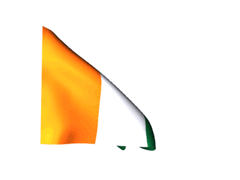
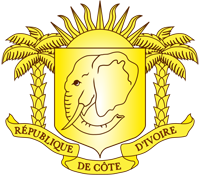



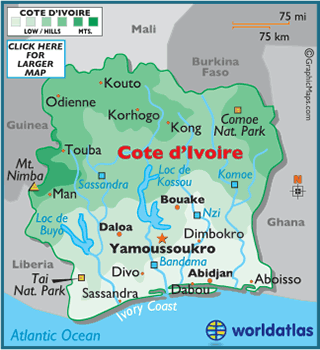
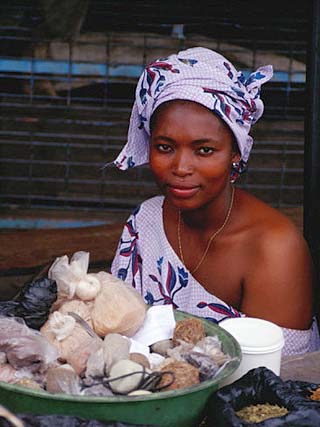

Tel Code..: +225
Ethopian Airlines - Lufthansa -Air France- Egypt Air - Emirates- KLM - Royal Air Maroc -
Viza..: Needs
Courses or boosters usually advised: Hepatitis A; Poliomyelitis; Tetanus; Typhoid; Yellow Fever.
Other vaccines to consider: Cholera; Diphtheria; Hepatitis B; Meningococcal Meningitis; Rabies.
Yellow fever vaccination certificate required for travellers over 1 year of age arriving from countries with risk of yellow fever transmission.
President: Alassane Ouattara (2011)
Prime Minister: Daniel Kablan Duncan (2012)
Land area: 122,780 sq mi (318,000 sq km); total area: 124,502 sq mi (322,460 sq km)
Population (2012 est.): 21,925,093 (growth rate: 2.04%); birth rate: 30.4/1000; infant mortality rate: 63.2/1000; life expectancy: 63.2; density per sq km: 57
Capital (2009 est.): Yamoussoukro (official), 808,000; Largest city and administrative center: Abidjan, 4,009,000
Monetary unit: CFA Franc
Name: Ivory Coast
Before the Europeans colonized
the region, the Ivory Coast was controlled by various states, including the
Gyaaman, Kong Empire and Baoule.
The Kong Empire was known for being an affluent center of agriculture and trade,
but ethnic diversity ultimately destroyed the kingdom.
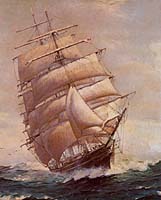 In the 15th century,
thePortuguese were
the first Europeans to explore the Ivory Coast of Africa,
and various other Europeansea
powers followed shortly after, setting up a trade route for gold, ivory, pepper,
and slaves.
In the 15th century,
thePortuguese were
the first Europeans to explore the Ivory Coast of Africa,
and various other Europeansea
powers followed shortly after, setting up a trade route for gold, ivory, pepper,
and slaves.
During the 17th and 18th centuries the Frenchestablished
settlements along the coast and began a long relationship that would change the
culture, and for that matter, the economic future (and name) of this African nation.
The French colonial
policy integrated French language,
institutions, laws and customs into the Ivory Coast, and even after declaring
independence in 1960, Cote d'Ivoire retained close economic (export/import) ties
withFrance,
becoming one of the most prosperous Africancountries.
Over the centuries it suffered through very little political turmoil, but
recently, a few poorly-timed military coups and subsequent internal conflicts
increased its national debt, and dramatically curtailed its once profitable
tourism industry.
An armed uprising in September 2002 sparked the First Ivorian Civil War, and the
country became divided between rebel leader Guillaume Soro and president Laurent
Gbagbo.
Although much of the fighting ended in 2004, civil unrest for the Ivory Coast
lasted until a peace agreement was reached in 2007.
Organized elections that were originally planned for 2005 were postponed until
2010, five years after Gbagbo's term was to have ended, and this ultimately led
to a second civil war.
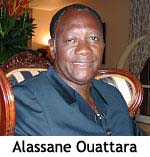 Months of
unsuccessful negotiations pushed the crisis into a critical state, as human
rights violations were brought against both sides; in addition, the election
results had both Gbagbo and his opponent Alassane Ouattara claiming victory.
Months of
unsuccessful negotiations pushed the crisis into a critical state, as human
rights violations were brought against both sides; in addition, the election
results had both Gbagbo and his opponent Alassane Ouattara claiming victory.
On April 11, 2011, Gbagbo was arrested by military forces, and Ouattara assumed
office.
Cote d'Ivoire's modern difficulties are sadly endemic on much of the African continent,
as it, like many other countries, suffers from internal unrest, financial
instability, low literacy levels and serious health care problems.
Most of Cote d'Ivoire (north
to south)
is a forested plateau, one that gradually slopes down to the Atlantic
Ocean coastal
areas.
Exceptions are the edges of the Guinea Highlands (4000
- 5000 ft. peaks)
on its western border with Guinea,
in the far northwest and the elevated savanna and forest of the northeast.
Extending across the middle of the country is the Guinean forest-savanna mosaic,
a transition zone between the coastal forests and interior savannas
The highest point of the Cote d'Ivoire is Monts Nimba at 5,748 ft (1,752 m), and
the lowest point is the Gulf of Guinea (0 m).
Major rivers, including the Bandama, Komoe and Sassandra, drain the plateau.
Large lakes include Loc de Ebire and Loc de Kossou.
Climate:
The coastal regions of Cote d'Ivoire are warm throughout the year, with average
highs near 80°F (26°C). Rainfall here is heavy May through July, with up to 80
inches commonplace,
The forested central region is a bit warmer, with heavy rains March through May
(70 inches on average).
In the northern reaches of the country the daily high temperatures reach into
the 90's (32°C), with somewhat more moderate rainfall amounts.
One of the wealthiest members of what was French West Africa, Côte d'Ivoire enjoyed a high economic growth rate from its independence through the 1970s. In the 1980s it faced economic difficulties, including a drop in commodity prices and huge foreign debt payments. Economic productivity and exports subsequently grew with the introduction of a market economy and International Monetary Fund–sponsored reforms, but since the late 1990s ethnic and political unrest have hurt the economy.
Despite steady industrialization since the 1960s, the country is still predominantly agricultural, with some 68% of the population engaged in farming. Corn, rice, manioc, sweet potatoes, and sugarcane are the main subsistence crops. Côte d'Ivoire is among the world's largest producers and exporters of coffee, cocoa beans, and palm-kernel oil. Cotton, bananas, and pineapples are also raised for export. Mahogany and other hardwoods provide timber, which is also a valuable export, and the production of rubber has increased substantially in recent years. Livestock is raised in the savannas, and fishing is important. Among the country's industries are the production of foodstuffs, beverages, wood products, textiles, and fertilizer; oil refining (offshore production of petroleum and natural gas began in the early 1980s); motor vehicle assembly; and ship construction and repair. There is some mining, including gold, diamonds, and nickel, but in 2005 the UN Security Council banned Ivoirian diamond exports because the gems financed the purchase of guns used in the country's civil strife. Fuel, capital equipment, and foodstuffs are imported. France, Nigeria, and the United States are the chief trading partners.
Côte d'Ivoire is governed under the constitution of 2000. The president, who is the head of state, is popularly elected to a five-year term; there are no term limits. The prime minister, who is the head of government, is appointed by the president. The 225 members of the unicameral National Assembly are popularly elected to five-year terms. Administratively, the country is divided into 19 regions.
The country consists of a coastal lowland in the south, a densely forested plateau in the interior, and a region of upland savannas in the north. Rainfall is heavy, especially along the coast. There are over 60 ethnic groups in Côte d'Ivoire; the major groups are the Baoule, Beti, Senufo, Malinke, Anyi, and Dan. There are also a significant number of immigrants from neighboring Burkina Faso, Mali, and Guinea, as well as many people of Lebanese and French descent. The population is about 40% Muslim, with some 35% following traditional religious beliefs, and 25% Christian. The Muslims predominate in the north, while Christians are concentrated in the south. French is the official language. There are also some 60 native dialects, with Dioula the most widely spoken.